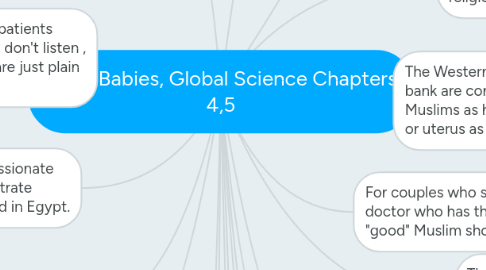Local Babies, Global Science Chapters 4,5
by Soraia Maciel

1. "Fatwas" are non-binding religious opinions that interprets behaviors or actions. They come from the highest ranking religious figures and are often supported by the government.
2. It is important to know that any form of 3rd party donations related to I.V.F treatments are considered the equivalent of "zina", adultery. This directly impacts kinship, lineage and inheritance. An illegitimate child is a real stigma regardless of social class.
3. High standards of moral behavior in regards to Islam and the influence of I.V.F run fairly consistently across all social classes.( Money may be the obvious obstacle but religious morality dictates treatment regardless of the ability to pay.)
4. The boom seen in private providers of I.V.F in Egypt has led to reduced quality of services and fierce competition between providers.
5. Inhorn focuses on the 3 original and most successful clinics with whom she collaborated with and finds that they all use "patient-centered medicine".
6. Dr. Yehia and Dr. Zaki show a caring, compassionate concern towards their patients and demonstrate intrapersonal competence not normally used in Egypt.
7. Some of the most common complaints from patients about other doctors is that they are too busy, don't listen , don't take the time to answer questions and are just plain "cruel".
8. The "physician centered" practice used by most Egyptian doctors is justified by them, for there is no class in Medical school on human discourse. Doctors remain aloof, authoritative and disrespectful towards lower class patients.
9. Patients want to be able to trust their doctors, not be lied to about inaccurate success rates as well as comply with religious morality .
10. Perhaps nothing influences Egyptian couples seeking I.V.F treatments more than religion.
11. The Western concept of artificial insemination and the "local" sperm bank are concepts forbidden by the Islamic religion and viewed by Muslims as highly immoral. (No 3rd party donations of sperms, egg, ova or uterus as written in Islamic legal code)
12. The idea of "transnationalism" (relocating abroad to countries such as Britain or the U.S to receive cutting edge treatments in infertility) are generally frowned upon due not only to excessive cost but for the lack of religious morality these nations display.
13. For couples who seek I.V.F treatment choosing a doctor who has the same religious standards as any "good" Muslim should have, is of key importance.
14. Muslims and Coptic Christians alike however, do not view their religions as constraining in anyway when it comes to infertility issues.
15. Inhorn touches upon the subject of abortion in Egypt, it is officially criminalized in civil code yet is widely practiced by Muslim Doctors and female patients.
16. Inhorn suggests that the rise of religiosity and Islamism seen in the 80-90's has led Egyptians returning to "traditional roles".
17. In stark contrast the concept of secularization states that as industrial societies grow, the influence of religion diminishes, but not in Islam.
18. Islam is considered a comprehensive, encompassing religion, one that covers many aspects of daily activities and provides instruction on everyday life.
19. "Doctor Shopping" as Inhorn describes it, is a form of Egyptian Medical protest carried out by citizens tired of the lack of religiosity, dishonesty and greed .


